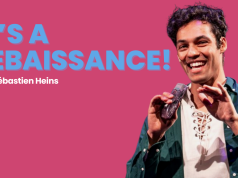Phone rings twice then voicemail recording “you’ve reached 647-280-66(static)leave a message after the tone (beep)
My name is Milton Lim and this is my first thought residency. This first thought goes out to all the torchbearers.
I have been thinking a lot about what diversity in the arts feels like the usual feelings of an uphill battle, of hurt feelings, of misunderstandings, of people struggling to have their voices heard, fighting against being made invisible. I am currently performing a show called “King of the Yees” at The Gateway Theatre in Richmond BC. The piece was written by an American playwright named Lauren Yee, directed by Sherry Yoon and it features 5 Asian-Canadian performers.
I think all of us in the cast knew that the show would feel special, if only because of the nation-wide discussions around diversity and seeing more people of colour on stage. But I think the most surprising thing was that we didn’t know what the process would feel like.
One of my cast mates Donna Soares once remarked to me that this show feels easy, that our task wasn’t to do external research like other shows but a lot of inward reflection instead. This opportunity to bring our own lived experience into the studio and seeing it paralleled so directly in the world of the show has felt so rewarding and affirming.
We’ve been laughing telling stories and connecting to a part of ourselves that we don’t often get to share while doing plays.
I don’t often do character acting as part of my practice, so to have all of this within a theatre setting feels refreshing.
There is still a lot of work to be done but it’s nice to know that this is also what diversity in the arts can feel like.
My name is Milton Lim and this is my second thought residency. This goes out to my parents.
I’ve been thinking a lot about how we carry people and ideas with us. My mom used to tell me: “if you love someone, make sure you tell them you love them every time you say goodbye because you never know if it will be the last time you see them.”
I like to think that it is not just about the meaningfulness of saying I love you, but about the repetition and the reminder, a safe-guarding and a just in case.
Tonight we close “King of the Yees”, and we say goodbye to a show that has had all of us involved thinking a lot about our families, and for anyone who knows Chinese culture, sometimes you don’t have to say I love you, sometimes you show it in other ways: (a song begins to play) this is the sound of us saying goodbye. (song continues with sound of warm voices talking)
My name is Milton Lim and this is my third thought residency. This goes out to the rebels.
Today I met up with a friend who is visiting from Hong Kong. We talked about the recent transgressions that occurred during the swearing in of new pro-democracy members in Hong Kong’s legislative council and the subsequent denials of their oaths.
I think about the ripples of the Umbrella Movement still resonating in these actions. I think about the overlapping of the underground and the public. I think about the voices of democracy. I think about Canada’s 2015 Federal election and those rallies to get Harper out. I think about Trudeau’s fleeting promises, in this case specifically proportional representation. And I think about the desire for effort to match outcome. I think about the values of getting rude and being loud in just the right places.
My name is Milton Lim and this is my fourth thought residency. Dedicated to the ESL community.
I’m currently taking part in the Block A program at Playwright’ s Theatre Centre, it consists of weekly writing workshops.
When I participate in the act of writing, I sometimes think of my friend Tyler Russell, Executive Director/Curator of the Centre A Gallery, and the time he asked me why I only create work in English. Why I directly/indirectly support linguistic colonization as part of my practice. At the time, I didn’t have a better answer than the fact that my only operative language is English, but since then I’ve been examining isolated components of language in an attempt to by-pass it, for example looking at the visual or the written instead of the aural or exploring only the affect of second person narrative. The option I’ve been avoiding is that I learn second language so that my artistic choice is not one so seemingly based out of necessity.
My name is Milton Lim and this is my fifth thought residency going out to my fellow otakus.
I grew up watching and continue to watch a lot of Japanese animation; I consider anime both a pastime and a passion. The video essayist behind ‘Every Frame a Painting’, Tony Zhou, once did a video on Satoshi Kon, the man who created Paprika Paranoia Agent, and Perfect Blue among several other influential animated works. Satoshi Kon once stated that he preferred animation over live action, saying that live action cuts too slow for his style of editing. Tony goes on to show two clips of a bag being thrown in someone’ s face, one live action and one animated —and the animated one completes and is perceived in fewer frames: it reads faster because there’s less visual information. I think that lesson, beautifully illustrated for me, the range of differences between perception and cognition.
My name is Milton Lim and this is my sixth thought residency going out to the gamers.
Like a lot of other people, I’ve been thinking about Virtual Reality. A game developer acquaintance of mine, once remarked to me that most people perceive VR as a simple extension of video games, however most video games operate with the principle that you move across a large map or area to achieve your goal. VR on the other hand, often offers limited physical space, wires connecting you to a computer tower, and real-life obstructions, making the same topographical movement extremely tricky.
Certain games and developers are working on ways around this — creating in-game teleportation mechanics, room-based systems, and walking controllers, but at the end of the day, my acquaintances’ assertion was that VR is not about progression via locomotion. That the more innovative or successful video games moving into VR will relinquish this fundamental game mechanic, in order to reimagine our approach to conflict, obstructions, and goals.
My name is Milton Lim and this is my seventh thought residency dedicated to the wandering minds.
During my undergraduate psychology classes, like many other students, my friend Mateusz and I would have a ritual of cramming, sometimes hours before our exams. It always seemed like he was worse off than I was, but maybe that’ s just my hindsight bias. One of the days in desperation, I said “why are we so lazy?!” and he remarked, “HEY, it takes EFFORT to be this lazy.”
I wouldn’t choose those words, but I like that empty space was framed as a conscious decision, similar to meditation but without taking itself seriously. I like to think that he knew the necessity of carving out room to be inspired, for his creativity and his passions. Or we were just lazy.
My name is Milton Lim and this is my eighth thought residency dedicated to the ugly.
Last night I hosted a horror-themed video game night with my friends at the International Centre of Arts and Technology. We primarily played P.T., a demo of a canceled game called Silent Hills by Hideo Kojima in collaboration with filmmaker Guillermo Del Toro. The game prioritizes horror instead of the game aspect. It takes place in one haunted L-shaped hallway that keeps repeating over and over again — a simple gesture both effective and maddening. P.T. forces you to slow down and sit with your fear in order to progress and some of the puzzles are close to impossible. I keep thinking about the simplicity of the gesture, its iteration, and the tension of wanting and not wanting to continue.
It’s late and I’m having trouble sleeping.
My name is Milton Lim and this is my ninth thought residency going out to your eyes and ears.
I just finished watching season 2 of Charlie Brooker’s Black Mirror. So, today I’m thinking about my relationship to technology, especially user interface and design for touch screens. I think about the gesture of swiping as a violent act. Even in definition swiping is suggested to be a strong sweeping blow. I think about
the etymology of the word, suggesting that it was a variant of sweep, and I think about the connections of cleanliness: wiping, sweeping, clearing, but then there’s swiping. For all of its utility, I wonder about these gestures and how it situates me in my experience of news, dating applications, social media, phone calls, people, systems, and notions of self-identity.
My name is Milton Lim and this is my tenth thought residency going out to the consumers and to the future.
I’ve been intrigued by a genre of electronic music called Vaporwave over the last year and a bit. It’s a blend of synthesized 80s and 90s corporate mood music; it is often bright and cheery, modulated and slowed down, playing between the slightly familiar and the very familiar. It plays on retro culture aesthetics, so it’s nostalgia-inducing and by muzak standards, I actually find it quite pleasing to the ear.
Vaporwave potentially gets its name from Vaporware: technology that is introduced or announced by companies that never gets produced. The very idea is fleeting. I find the music so curious because it both suggests its anti-capitalist nature and yet it embraces its own hyper-capitalism through its earnest use of material. It’s ironic and sincere — pleasurable and numbing. It seems to both want to refuse and accept our very likely future.
Sometimes I listen to this music and I think: this is where we’re headed.
Hi David Yee, this is Milton Lim this is my eleventh and final thought dedicated to the incomplete.
I hope that the opening for your show at the Factory went smoothly, I wish I could’ve been there to support you in person.
Today, I’ve been thinking about the preciousness of showing work. I’ve been following this artist called ‘Beeple’ for a couple years. His real name is Mike Winkleman and he’s a graphic designer from Wisconsin. He’s fairly well known for what he called his ‘everydays’ — basically, he publicly posts a work he has been completing from start to finish every day. It serves as a way for him to better his practice and to remove any inhibitions about sharing his pieces no matter how shitty he thinks it is.
It’s a process he’s done for 3,472 consecutive days at the time of this recording and scrolling through his works, you really do see the improvement.
Now, one of the things that I appreciate about your show “acquiesce” is that it’s one of your earliest works and that it was lost behind a filing cabinet for almost a decade. And I know it took some convincing to get you to say yes to having it produced.
I think it takes courage to share something you know you wrote when you were younger, more naïve and less experienced. More than that, it reminds me that things are almost always incomplete, that each project is just part of the practice, and that sometimes it’s best to share things before it’s ready because otherwise, you might never ever share it. I even consider that mentorship is a process of transmitting the incomplete.
I think there’s a lot to see in the raw ideas. Perhaps more than the finished products.
So David here’s to incomplete ideas and to all th—









